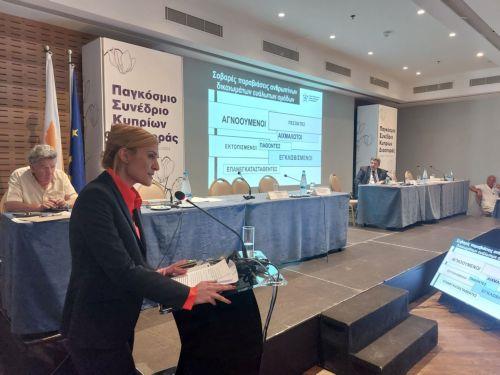
Newsroom
A new approach to gathering information on the whereabouts of missing persons in Cyprus has yielded significant results, according to Anna Aristotelous, Head of Humanitarian Affairs for Missing Persons and the Enclaved. Speaking at the annual World Conference of Overseas Cypriots in Nicosia, Aristotelous announced that six identifications of missing persons were made in just one month following a change in strategy.
Aristotelous emphasized the critical importance of resolving the fate of missing persons, describing it as a top priority. To enhance efforts, the approach towards informants has been revised. Previously, witness statements were collected in an interrogation-style manner, which has now been abandoned. This shift to a more approachable and less formal method has increased the flow of information, leading to the recent successful identifications.

In the past year, a total of 21 remains have been identified, with seven pertaining to the Republic of Cyprus' program. Among these, six were soldiers from the Greek National Guard. Aristotelous highlighted the office's commitment to supporting the families of the missing, aiming to determine each individual's fate and safeguard their human rights. Out of the 1,619 missing persons, 51% have been identified, leaving 776 still unaccounted for. The missing include 619 civilians, among them women and children, and 1,000 soldiers, reservists, and volunteers.
The number of fallen individuals stands at 960, with 527 identified and 433 still missing, including 55 Greeks. Aristotelous underscored the tragic impact on women and children, noting that of the 36 missing children, only 20 have been identified, with ages ranging from 6 months to 17 years. She also pointed out that women and children are significant yet often overlooked victims of the 1974 Turkish invasion.
Regarding the enclaved population, Aristotelous mentioned ongoing contact and efforts to address their daily challenges, including food supply, passage through checkpoints, and housing issues. The revised Resettlement Plan now offers incentives for staying and resettling in Turkish-occupied villages, with the recent reopening of a kindergarten and primary school in Kormakitis as a notable achievement.
Currently, there are 331 enclaved individuals and 360 resettled persons, including 87 enclaved and 32 resettled children. Aristotelous acknowledged the critical role of the Cypriot diaspora in supporting efforts to resolve the Cyprus problem.
Cyprus has been divided since 1974, following a Turkish invasion that occupied 37% of the island. The fate of many individuals remains unresolved, with efforts to find a political solution ongoing but so far unsuccessful. The UN continues to facilitate negotiations, recently appointing María Ángela Holguín Cuéllar as a personal envoy to seek common ground in the peace process.
[Information from CNA]































